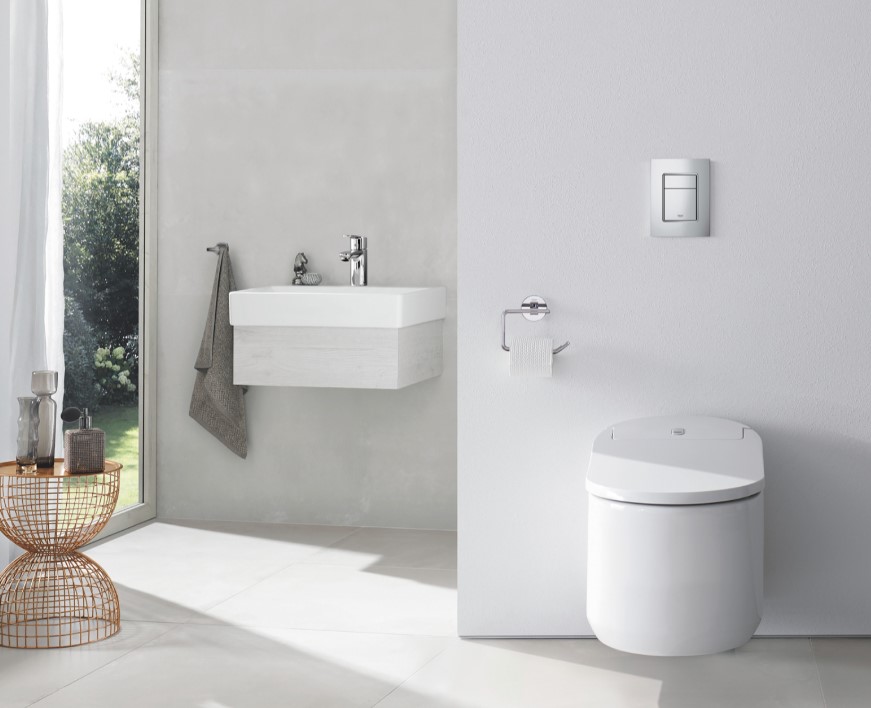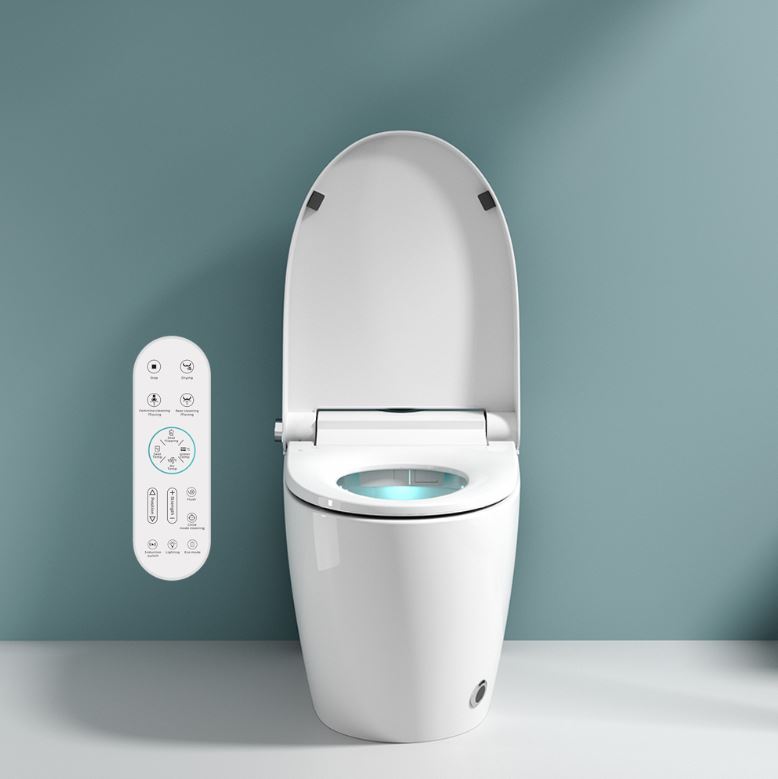What is a shower toilet and are they legal to install in the UK?
Shower toilets, also known as bidet toilets, can improve bathroom hygiene but with them needing an electrical connection in the bathroom — are they legal to install?

What is a shower toilet? With bathroom experts saying this style of loo is growing in popularity, understanding what one is and whether it might be a good option for your home is a sensible starting point.
Analysts are predicating sales of shower toilets to grow by 8%, according to the recent European Bidet Seats & Shower Toilets Market study, indicating that homeowner's types of toilet preferences may be slowing changing. The report also found that high-end convenient and comfort-enhancing smart products are set to become more commonplace in the modern home as more refurbishments take place.
But with this clever toilet, and other types of smart toilet, potentially needing an electrical connection within a wet bathroom environment, are they actually legal to install? We take it back to the basics and explain everything you need to know about the shower toilet itself as well as the legalities.
What is a shower toilet?
Shower toilets, also known as bidet toilets, allow users to wash and clean yourself with water instead of using toilet paper, similar to a bidet. The water – which can be heated – is delivered with a sprayer/shower.
When you use the bidet wash, the dirty water drains into the toilet bowl. When you’re done, just flush the toilet as normal.
The market is currently divided into separate bidet seats and integrated shower toilets. Bidet seats are sold separately from the ceramic bowl and can be compatible with multiple models of toilet.
Benjamin Fix, CEO, and Co-Founder of sproos!, the home improvement brand for renters, says you do not need permission from water companies to install them and there are no legal issues with electrical or plumbing as long as the product carries all required plumbing and electrical approvals. This is sometimes an issue with cheap imports.
He adds that not every shower toilet requires a power supply as some operate on cold water only.
Are shower toilets legal in the UK?
While you definitely can't have electrical sockets installed in a bathroom, the UK's Institute of Electrical and Electronics Engineers (IEE) regulations do allow some hard-wired electrical items to be installed, such as shower toilets, macerator toilets (what is a macerator toilet) and electric showers, as long as the item and the installation is carried out in accordance to the regulations.
Electrician Jonathan Bacon explained to Homebuilding & Renovating: "IEE wiring regulations prohibit the installation of sockets in the bathroom but a shower toilet would be hard wired with either a fuse connection unit or isolator.
"This would need to be installed in accordance with the IEE regulations by an electrician and be certified for use within the bathroom environment."
What are the advantages of a shower toilet?
Manufacturers claim shower toilets offer much better hygiene than using toilet paper and they are better for the environment since no paper is needed.
Eliminating toilet paper also reduces the likelihood of blockages and floods. More advanced models of shower toilets have additional features, like an air dryer, heated seat, temperature, and pressure control, deodorizer, and even a nightlight for your toilet bowl. Those with decreased mobility have also reported finding shower toilets helpful for personal hygiene.
While the range of shower toilets is not that huge at the moment in the UK, this smart ENERGJ bidet toilet is available to buy from B&Q with lights, a warming seat, autoflush, a foot sensor (for hygienic no hand touch), autoheated water, autodryer and adjustable water pressure.
Ben from Sproos! adds that a shower toilet also saves space over a traditional bidet. However, only a very small amount of people in the UK have a traditional bidet, while it is a common product in countries like Italy and France.

What are the disadvantages of a shower toilet?
A shower toilet is significantly more expensive than a standard toilet. They are often 10x more expensive to buy and install and slightly increase water consumption.
Bringing electrical power supply to the toilet can be costly and can require a full renovation and the services of an electrician.
How easy is it to install a shower toilet?
Ben says installation is certainly a little more complex but the ease of overall installation has improved.
Shower toilets consist of either an integrated shower unit or a bidet seat packaged with a specific ceramic base, which are easier to retrofit. The bidet seats are typically cheaper too, like this bidet seat from B&Q for £120, but often are far more basic and do not have the smart features of an integrated smart shower toilet. That said, some do, like this plug in VOVO bidet seat on Amazon for £399 with deodoriser, autoflushing, lights and heated seat. Of course, UK laws would not permit this to be plugged into a bathroom socket so it would need to be hard wired by a certified electrician as well as checking the unit is compliant with IEE regulations before purchasing.
Brian Inami, of Brondell, said: “Bidet toilet seats are designed to be installed by anyone, no special skills needed. This type of bidet attaches directly to your existing toilet, so you don't even need to worry about new plumbing.
“A bidet toilet seat connects to your home’s water supply. The water is diverted to the bidet before it even reaches your toilet. This means that your bidet water is as clean as the water from your shower or sink.”
Homebuilding and Renovating has a guide on fitting a toilet seat and toilet dimensions if you are thinking of improving your smallest room.
“Bidet seats are a great retrofit option and deliver the same core advantages like a luxurious shower toilet,” Ben adds.
Get the Homebuilding & Renovating Newsletter
Bring your dream home to life with expert advice, how to guides and design inspiration. Sign up for our newsletter and get two free tickets to a Homebuilding & Renovating Show near you.
Sam is based in Coventry and has been a news reporter for nearly 20 years. His work has featured in the Mirror, The Sun, MailOnline, the Independent, and news outlets throughout the world. As a copywriter, he has written for clients as diverse as Saint-Gobain, Michelin, Halfords Autocentre, Great British Heating, and Irwin Industrial Tools. During the pandemic, he converted a van into a mini-camper and is currently planning to convert his shed into an office and Star Wars shrine.

